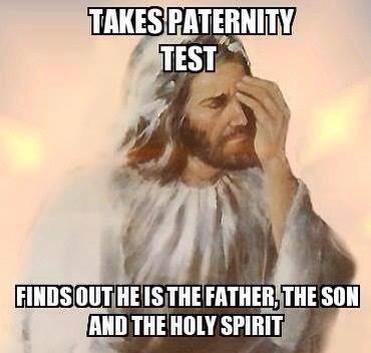I partially agree with this. Even in the earliest years following Christ there were divergent views not just on God but the nature of Christ Himself. I wouldn't say for sure that it was a fairly even split though, depending on which groups we are talking about. The problem here is not just competing or diverse views on what eventually developed into the trinitarian doctrine we see today, but quasi Christian groups so fundamentally different from today's forms of both trinitarian and non trinitarian views that I am not sure if they can be taken as reliable sources. First you had the gnostics which was a mystery secretive religion that was more neoplatonic in nature. There were the Donatists which taught Christ never had a physical form, Marcionites who believed God of the Old Testament was not the same as the New and tried to strike the Old Testament from Biblical canon around the year 150 AD (Marcion himself also being somewhat of an anti semite), and later on there were groups like the Arians who did not even believe in the divinity of Christ (and that Christ was a created being instead). So really to me for any fruitful exploration of this issue we need to focus on some of these less radical divergent views in the early centuries. Where people would draw that line is probably the subject of debate in itself. For example, in my mind the above mentioned groups are not even worth considering and thus not part of the conversation, while say a secular scholar coming in with a different bias than my own may decide to include them as legitimate Christian theologies.ArcticFox wrote:Another thing to keep in mind is that the Trinity doctrine was hardly universal in the early days. It wasn't until centuries after Christ's time on Earth that the church councils settled on the Trinity doctrine. Prior to that, there was a fairly even split.
It is also true that the doctrine of the Trinity as we know it today was not finalized until the ecumenical councils. It was not explicitly spelled out this way until that point. It should also be noted though that the canon of scripture, while also coming together unofficially in centuries prior, was not made official (and even then not entirely completed) until those same councils.
I make note of this because the same I believe is true of the Trinity doctrine. I remember the first mention of it or a precursor to it was Ignatius of Antioch in the early 2nd century. There were others as well in later centuries prior to the ecumenical councils but it was not fully developed and yes in some cases not trinitarian proper. Whether one thinks it was a trinitarian view in its infancy or evidence of a far greater prevalence of non trinitarian views is a matter of what we out our faith in.
I put my faith in the former because the early church as a whole did begin to coalesce over the next few centuries into an increasingly coherent entity as believers dug further into the Christian revelation as revealed by Christ and the Apostles. Though there were perhaps more variances amongst the local churches, there was a lot more unity in spirit, tradition, doctrine, and scripture as time went on, more than some historians give them credit for in my opinion. All these things we are discussing came together in the same time period and none of them came about in a vacuum.
So from all this the question is again (as Sstavix said earlier), a question of faith. Do you believe this represents an unbroken line of faith and teaching from Christ down to today, that the traditional Christian teachings were not correct but the early church fathers did the best they could with what they had, or were they just some ancient old guys making this stuff up as they went along?
I believe of course in the first. I believe that the revelation received from Christ and the Apostles and handed down through the generations was the ultimate revelation and standard by which all further revelations, commentaries, biblical scholarship, visions, apparitions, miracles, prophecies, etc., are held up against. There are no new outpourings of the Holy Spirit, for Pentecost in the book of Acts already takes care of it since the Holy Spirit never left us and never ceased to continue working. There are no new revelations other than ones that deepen our understanding of the original one once delivered to the saints, and certainly none that run counter to it or replace it.
For me personally it goes well beyond that. It was the search of truth, and not just in the sense of merely being "right", but also to know deep down what is fully Christian, what is Christian but perhaps incomplete or a bit mistaken, and what is just completely out of left field. I never had any experiences with the Mormon Church, as mine were Lutheran, Evangelical and later Pentecostal/Charismatic Churches. I had considered Catholic at some points but there were some doctrines I just couldn't accept. I confess I always did have a thing for tradition regardless of my changing stance on it over the years.
Empty traditions are to be avoided at all costs, but I realized not all of them are empty (in recent years I find it more of a stereotype of more traditionalist churches) and done right can actually anchor ones faith. Later on in life I came to the conclusion that the Bible alone could not be enough. Too many interpretations, too many contradictory views, and too many times did it become a shouting match. There for me was no stability in doctrine, no discernibility, and no certainty if you were even a Christian or even remotely close to one. It was always about who sounded the most convincing or which viewpoint made " the most sense" to them. This permeated everything. My friends and I always had a good sense of knowing that there was a very key difference between when the Holy Spirit spoke to us in prayer or Bible study and when it was just us projecting our own ideas as if it were His. It was never easy to tell where those differences were however. Oftentimes even those answers were somewhat contradictory and often dictated by whoever sounded most convincing, had enough influence or authority to dictate it, or had just received a powerful enough "vision" or prayer experience which vindicated it. Sometimes what was Christian changed with the times based on what was popular and fashionable, other times it changed when leadership changed hands, other times it would change just because someone simply did not like what someone else said in either a bible study or casual conversation. All these factions and schisms that could form at a moments notice and without warning could not be what Paul meant when he wrote against factions in Scripture. When studying Christian History in college I had realized there was a lot more to the story than I had thought, and it was these things that later in life led me to where I am today.






